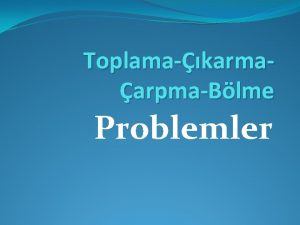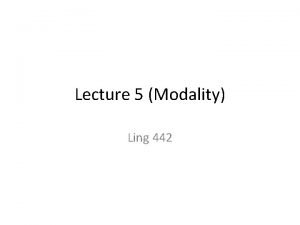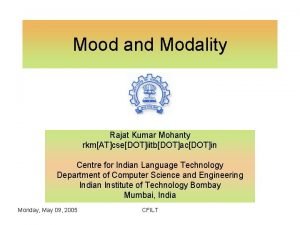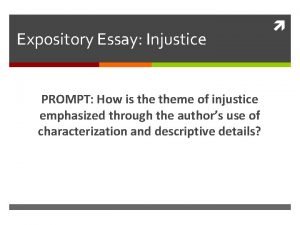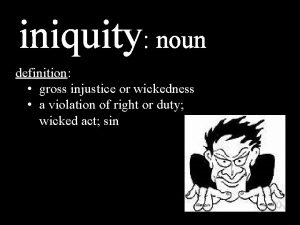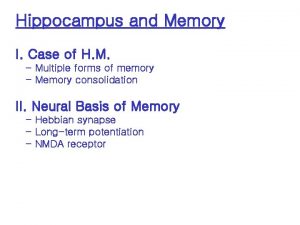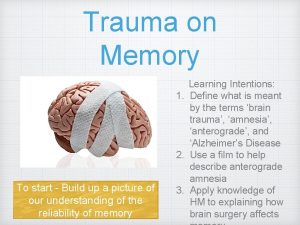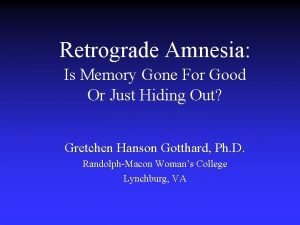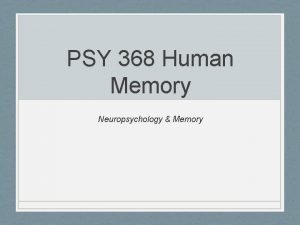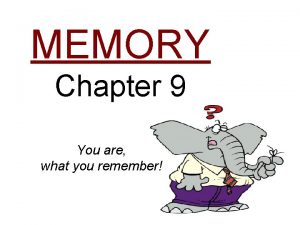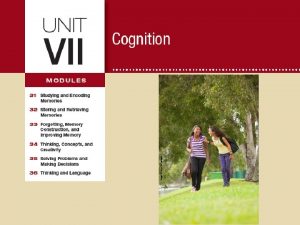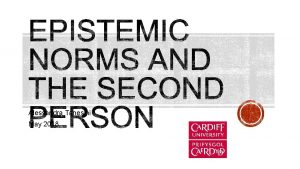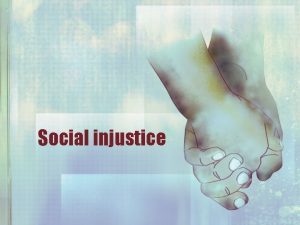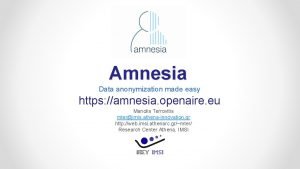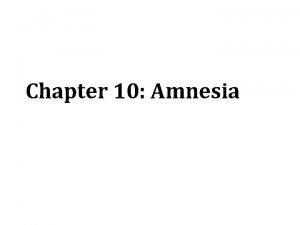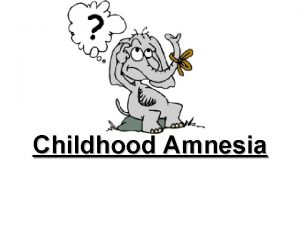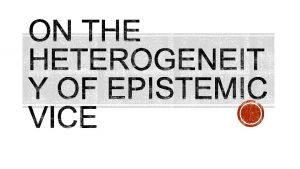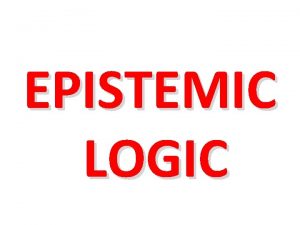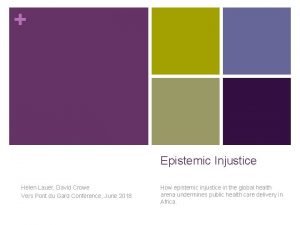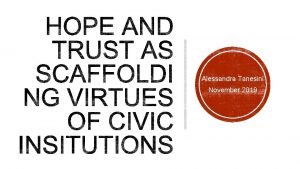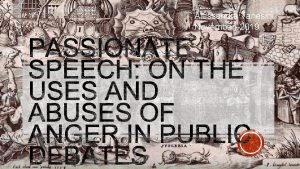COLLECTIVE AMNESIA AND EPISTEMIC INJUSTICE Alessandra Tanesini Exeter




















- Slides: 20

COLLECTIVE AMNESIA AND EPISTEMIC INJUSTICE Alessandra Tanesini Exeter May 2016

Collective Amnesia and Epistemic Injustice 2

Collective Amnesia and Epistemic Injustice 3 Main aims • 1. to show that the formation and maintenance of collective memories requires that other events are to some extent forgotten. • 2. to argue that sometimes collective mnemonic silence or forgetfulness is the result of cognitive effort to create and preserve ignorance. This is collective amnesia. • 3. to demonstrate that collective amnesia is harmful

Collective Amnesia and Epistemic Injustice 4 The plan • 1. the psychology of human biological memory • 2. the formation and maintenance of shared and collective memories • 3. scaffolded cognition and scaffolded memory • 4. ignorance as an achievement • 5. collective amnesia as collective memory ignorance • 6. collective memory and self-trust • 7. the harms of collective amnesia

Human Biological Memory Adapted from Michaelian (2012) cues Remembering Audience 5

Human biological memory 6 The functions of memory • Planning future activities (Schacter, 2012) • Strengthening social bonds • Hence, memory is not maladaptive despite its highly constructed nature

Shared and Collective Memories 7 Collaborative Remembering • Collaborative remembering and strengthening social bonds • Transactive memory systems (Sutton et al 2010). • Couple recollecting • Cross-cuing • Construction of shared memory

Shared and Collective Memories 8 Shared memories and SS-RIF • Retrieval Induced Forgetting (Coman, Manier and Hirst, 2009).

Shared and Collective Memories 9 Shared memories and SS-RIF • Retrieval induced forgetting can be shared SS-RIF(Stone et al. , 2012; Hirst and Marnier, 2008). • Shared memories developed by transactive memory systems manifest SS-RIF • Hence shared memories will tend to converge to some extent in the direction of the pre-existing recollections of those who do most of the talking

Shared and Collective Memories 10 Collective memories • “collective memories” are shared enduring memories (including of events that current members have not directly witnessed) which are part of the group’s identity (Hirst and Manier, 2008; Stone and Hurst, 2014)

Shared and Collective Memories 11 Collective Memories • Collective memories are subject to processes of formation and transformation include mechanisms which lead to mnemonic convergence of initially disparate individual memories • Social contagion (e. g. , implantation of false memories) especially prevalent when • speakers arrogate for themselves the role of narrator (Brown, Coman and Hirst, 2009) • Speakers are perceived as experts (see Hirst and Echterhoff 2011) • Exposure and retrieval effects • Repetition and affected by saying-is-believing-effect(Hirst and Echterhoff 2011). • SS-RIF (Stone and Hirst, 2014)

Scaffolded Cognition and Scaffolded Memory 12 Scaffolded Cognition • A scaffold is something- typically outside the skin of the cognizer- that shapes, structures or directs cognition. • Scaffolds facilitate cognition • By lowering cognitive load (e. g. , pen and paper to make an addition) • By allowing success in tasks one would otherwise be unable to perform (e. g. , use of calculator) • Scaffolds can emerge • By co-adaptation (e. g. , the formation of a path) • By conscious design

Scaffolded Cognition and Scaffolded Memory 13 Scaffolding for ignorance • Scaffolds can also be obstacles to cognition • By making some tasks impossible • By raising the cognitive load • Example: Supermarket Shelving • These kinds of scaffolds emerge in informational niches that are contested spaces (Sterelny, 2010) in which human beings do not engage in fully co-operative behaviour. • Examples: epistemically polluted informational niches

Scaffolded Cognition and Scaffolded Memory 14 Human Memory and Scaffolding • Human memory is highly scaffolded: • Storage Devices: archives, diaries, notebooks • These external memory devices are very different from human biological memory (Donald, 1991). • Mnemonics • Spatial arrangements (e. g. , drawers in a kitchen) • Mementoes • Scaffolded memories are subject to social contagion and SS-RIF • Some scaffolding promotes memory ignorance or forgetting of some aspects of the past

Ignorance as an Achievement 15 Strong Ignorance • Knowledge is an achievement due to cognitive ability (Pritchard 2009; Sosa, 2007; Greco, 2012) • Cognitive ability makes the telling contribution that turns the act into a success (analogy: the goal is credited to the person that directed it into the net even though it was a tap in) • Ignorance can be a success that is creditable to cognitive ability • Examples: • Ignorance resulting from goal driven motivated cognition • Deception and spreading of doubt • Ignorance due to environments that are scaffolded for ignorance

Collective Amnesia 16 Collective Amnesia • Collective amnesia is strong collective memory ignorance or forgetting. • Self-serving memories of the powerful can spread by social contagion and SS-RIF • Partial memories of those who have the power to talk and build memorials spread by exposure and SS-RIF • Creation of biased memory niches (statuary, toponomy, structuring of the day, the week, they year) • These processes generate strong collective memory ignorance

Intellectual Self-Trust and Collective Memory 17 Intellectual Self-Trust • Intellectual self-trust as a cognitive and affective stance of optimism toward one’s cognitive capacities in a given domain (Jones, 2012) • Comprises • confidence in one’s own abilities, • a belief in the reliability of one’s cognitive faculties, • a tendency to assert what one takes to be deliverances of one’s methods, and • a disposition to reflect on one’s belief only when there is a genuine need to do so. • Intellectual self-trust is sensitive to social power • Powerful individuals are likely to have inflated self-trust • Powerless individuals are likely to have deflated self-trust

Intellectual Self-Trust and Collective Memory 18 Intellectual Self-Trust and Collective Amnesia • Collective amnesia exacerbates the situation • In British collective memories Black British people only figure as a problem (Gilroy, 1987) • Such collective memories are corrosive of self-trust • This corrosion initiates a vicious circle which facilitates deepening biasing due to social contagion, exposure and SS-RIF

Memorial Injustice 19 Epistemic Injustice • Epistemic injustice is ‘a kind of injustice in which someone is wronged specifically in her capacity as a knower’ (Fricker, 2007, p. 20). • Evaluative respect and self-respect are respect based on a proper evaluation of a person’s (intellectual) qualities (Dillon, 2007; Tanesini, 2016) • Recognition respect and self-respect are respect based on the recognition that an individual is an (epistemic) agent. • Testimonial injustice: testimonial injustice is a credibility deficit due to identity prejudice • Exemplifies evaluative disrespect: not treating in a manner that accords with individual’s intellectual worth • Hermeneutical injustice: gap in collective interpretative resources causes cognitive disadvantage when interpreting experiences. • Exemplifies evaluative self-disrespect

Memorial Injustice 20 Memorial Injustice • Memorial injustice: gaps in the collective memories of a community so that some members are absent or represented as a threat or as problematic. • Memorial injustice is corrosive of intellectual self-trust in those individuals who cannot use collective memories to develop a sense of belonging • Intellectual self-trust is a necessary requirement for any other cognitive ability • Mnemonic injustice causes recognition self disrespect (as well as evaluative disrespect and self-disrespect.
 Bir otobüsteki 120 yolcunun 34 tanesi 1 durakta
Bir otobüsteki 120 yolcunun 34 tanesi 1 durakta Epistemic modality
Epistemic modality Modality
Modality Epistemic modality
Epistemic modality Knorr cetina epistemic cultures
Knorr cetina epistemic cultures Environmental injustice ap human geography
Environmental injustice ap human geography La fiche de lecture la ficelle
La fiche de lecture la ficelle Injustice theme statement
Injustice theme statement Injustice anywhere is a threat to justice anywhere
Injustice anywhere is a threat to justice anywhere Iniquitousness
Iniquitousness Social injustice examples
Social injustice examples Retrograde vs anterograde amnesia
Retrograde vs anterograde amnesia Anterograde amnesia
Anterograde amnesia Amnesia diencefálica
Amnesia diencefálica Types of amnesia
Types of amnesia Source amnesia
Source amnesia Hm study
Hm study Anterograde amnesia example
Anterograde amnesia example Anterograde amnesia
Anterograde amnesia Source amnesia
Source amnesia Source amnesia
Source amnesia
